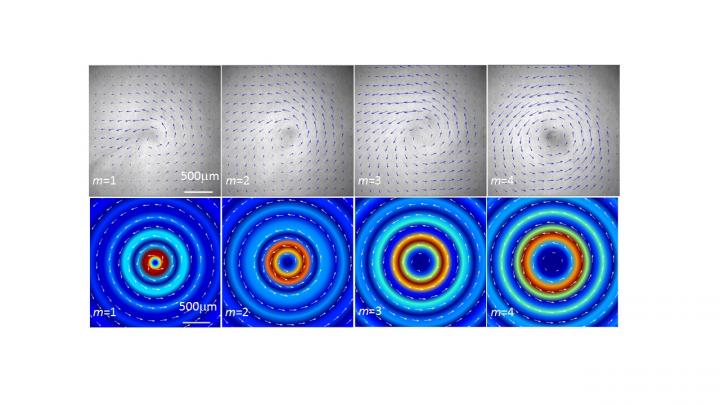A team of engineers have created tiny acoustic vortices and used them to grip and spin microscopic particles suspended in water.
The research by academics from the University of Bristol's Department of Mechanical Engineering and Northwestern Polytechnical University in China, is published in Physical Review Letters. The researchers have shown that acoustic vortices act like tornados of sound, causing microparticles to rotate and drawing them to the vortex core. Like a tornado, what happens to the particles depends strongly on their size.
Bruce Drinkwater, Professor of Ultrasonics in the Department of Mechanical Engineering and one of the authors of the study, said: "We have now shown that these vortices can rotate microparticles, which opens up potential applications such as the creation of microscopic centrifuges for biological cell sorting or small-scale, low-power water purification.

Microparticles are twisting in an acoustic vortex. Top row shows the experimental observations (0.5 micron particles) and the bottom row the predicted acoustic energy distribution. Credit: University of Bristol
"If the large-scale acoustic vortex devices were thought of as sonic screwdrivers, we have invented the watchmakers sonic screwdriver."
The research team used a number of tiny ultra-sonic loudspeakers arranged in a circle to create the swirling sound waves. They found that when a mixture of small microparticles (less than 1 micron) and water were introduced they rotated slowly about the vortex core. However, larger microparticles (household flour) were drawn into the core and were seen to spin at high speeds or become stuck in a series of circular rings due to acoustic radiation forces.
Dr ZhenYu Hong, of the Department of Applied Physics at Northwestern Polytechnical University in China, added: "Previously researchers have shown that much larger objects, centimetres in scale, could be rotated with acoustic vortices, proving that they carry rotational momentum."
'Observation of orbital angular momentum transfer from bessel-shaped acoustic vortices to diphasic liquid-microparticle mixtures' by ZhenYu Hong, Jie Zhang and Bruce W Drinkwater in Physical Review Letters.